8 Simple Tips to Manage a Countertop Compost Bin in the Summer
Interested in composting in the summer but worried about a messy countertop kitchen bin? Have no fear. Check out these tips to manage a countertop compost bin in the summer to prevent it from getting gross and annoying.
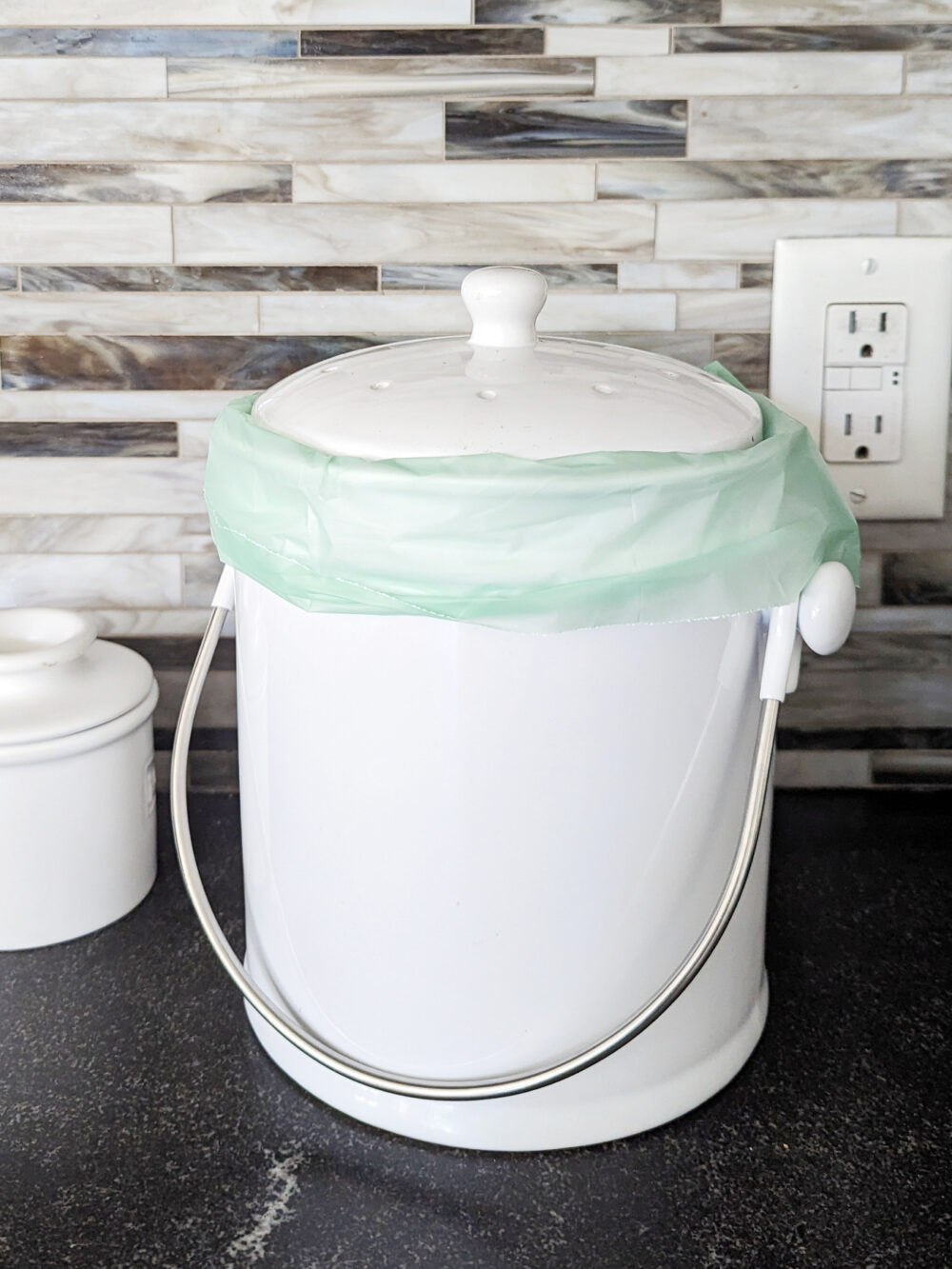
When the weather gets warmer, all the things start getting hotter and stinkier (and if you’re not careful, that could include your compost bin). While I’ve shared some tips in the past to help make sure your countertop compost bin doesn’t get smelly, mindfully managing your countertop compost bin is especially important in the summer when warmer temperatures can make your bin a more attractive home for fruit flies and other critters.
We’ve been composting in a variety of ways for many years. But through all the different iterations of composting, we’ve always used a small bin (about 1.0-1.5 gallons) with a charcoal filter built into the lid to collect food scraps throughout the day. Depending on how much food waste we generate, we might empty the bin once every couple of days up to once a week or so.
Undoubtedly, I get regular questions about whether or not a food scrap collection container gets gross, especially during the summer. And the answer is no different than anything else in your house – so long as you clean and maintain it, it stays clean. Pretty simple. And also like your trash, the bin gets gross more quickly in warmer weather.
Do You Stop Using Trash Pickup Because the Trash Can Gets Smelly?
I would be rich if I had a dollar for every time someone told me they didn’t compost because the bin gets gross when they don’t empty it often. Have you ever heard someone tell you they don’t collect trash or use a garbage pickup service because the trash can gets gross if they don’t take it out often enough? Of course not! They just take it out to the collection bin more frequently. So why do people get all hot and bothered and think composting is the problem when they have to empty the bin or it gets gross?
Just like we manage our trash, we also have to manage our food scraps. No one leaves their trash bin full for days on end when it starts to stink and blames it on the habit of collecting trash. They just know that part of life is managing the trash bin and emptying the trash bin when it’s full or starts to smell.
Now, if you don’t have access to a composting service or a food scrap drop-off location or you aren’t able to compost at home, I understand why collecting food scraps wouldn’t work for you. Unfortunately, we don’t have the mainstream infrastructure around composting that ought to be in place.
But if you have a curbside pickup service that’s accessible to you, a neighbor or Sharewaste host willing to accept your food scraps, or a compost bin you can manage on your own, a stinky countertop bucket should not be the reason you’re afraid to compost.
Managing a compost container on the countertop in the kitchen requires some attention to prevent odors and fruit flies (just like your trash). It follows the law of entropy like literally everything else in the world; without continued energy put into the system, it will start to fall into disarray. Welcome to life, friends… 🙂
Composting is a Big Stinkin’ Deal
Food waste is one of the largest environmental problems of our time. We need to make better use of our food so less goes to waste. But composting is also an important tool in keeping inevitable food waste out of landfills and incinerators. And composting offers a host of benefits on its own from reduced greenhouse gas emissions to healthier soil to protection from certain natural disasters and more.
If you can, it’s time to jump on the compost train. It’s picking up steam (which is great for the planet) and will likely make it easier for more people to get involved. It’s a slippery slope, in a good way! If you’re on the fence about composting and fear that notoriously stinky kitchen collection bin, here are some tips to ease your hesitations and help you manage a countertop compost bin successfully.
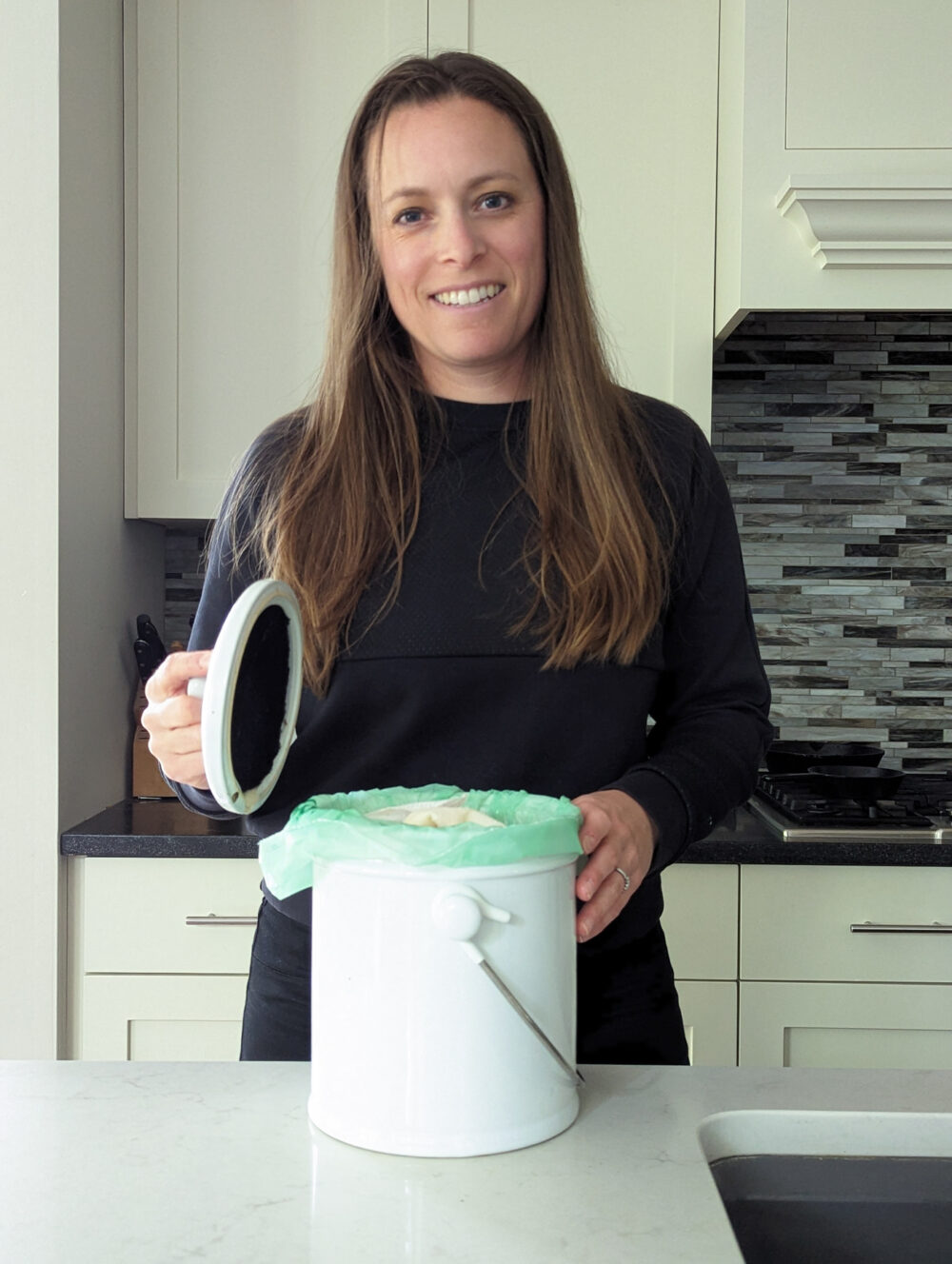
Use a lidded compost container (maybe with a charcoal filter)
Choose a compost container with a tight-fitting lid to prevent odors from escaping and fruit flies from entering. A sealed lid will help contain the smells and discourage pests. From experience, I can assure you that the lid will prevent nearly all smells from escaping the bin.
I use a ceramic compost bin that holds about 1 gallon of food scraps. It’s from Natural Home Brands. You can get it directly from their site and sometimes from places like Target. While I really like this bin, there are plenty of bins that are great.
Unless you empty your scraps daily into the compost bin or a larger collection bucket (like a 5-gallon bucket you might use for a curbside collection service or periodic drop-off system), I recommend choosing a lidded compost container that has a built-in charcoal filter option.
The charcoal filter keeps odors in the bin so they don’t attract insects and they stay out of your kitchen. Most bins have a certain size filter designed to fit snugly into the top of the lid (you can see the black filter in the photo above). As long as the charcoal filter fits well, you should be all set.
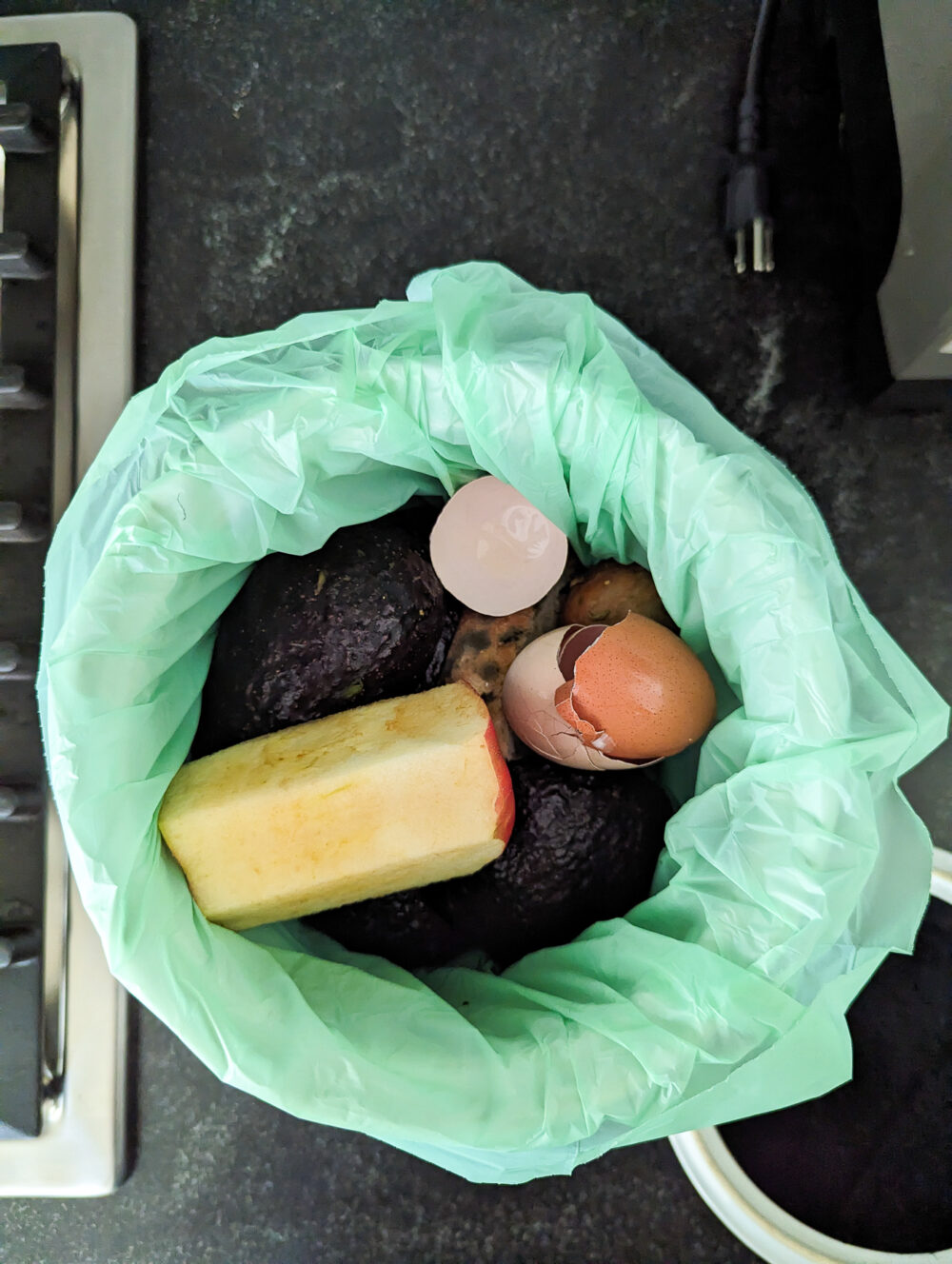
Line the compost container
To make cleaning easier and reduce odors, line the compost container with compostable liners or newspaper. These liners can be easily removed and replaced, preventing food residues from sticking to the container.
For years, I did not use a liner (they definitely aren’t necessary). Though I do think they make the composting process much less gross for those who are not into cleaning up the food scraps from the bottom of the container every few days.
Related Reading: Should I Use A Compostable Liner In My Compost Bucket?
Compostable liners make the bins easier to clean and help reduce odors in larger buckets if you’re using a curbside pickup service. You can tie them up like you tie up a trash bag and they keep the contents contained and easy to manage.
If you compost on your own, be sure to choose compostable liners that are suited for backyard composting. Some compostable plastics only break down in industrial composting facilities, which are more precisely managed and typically operate at higher temperatures.
Related Reading: Everyday Kitchen Items: Home Compostable vs. Industrial Compostable
Empty regularly
Empty the compost container frequently, especially if you’re generating a lot of kitchen scraps. Emptying it every day or every other day can help prevent the buildup of odors and fruit flies.
This becomes a sticking point for some people because it feels daunting to manage yet another thing in your kitchen. But this is no different from your trash, and that has become second nature. As I mentioned above, no one decides not to use a trash service because the trash starts to stink if they leave it in their kitchen for too many days in the heat of the summer.
Store in a cool place
To minimize odors and discourage fruit flies, store the compost container in a cool area of the kitchen. Avoid placing it near sources of heat, such as the stove or direct sunlight, as heat can accelerate decomposition and contribute to odors.
The microorganisms that do the heavy lifting of breaking down the food scraps (and the compostable liners) love hot environments. Heat speeds up the composting process, and this will be the case in your kitchen compost bin as well. Without proper oxygen and other materials needed for balanced decomposition, the food scrap bucket will start to stink. For example, don’t make the bin’s home near a south-facing window in summer that’s going to heat it up like an oven.
Freeze or refrigerate food scraps
If you find that the compost container quickly becomes smelly, consider storing particularly odorous scraps in the freezer or refrigerator. This helps slow down the decomposition process and reduces the potential for odors and fruit flies. Once you’re ready to empty the compost, you can add the frozen or refrigerated scraps to the main compost bin.
I’ve only done this a few times when I wanted to compost some meat scraps long before our bi-weekly curbside compost pickup service was scheduled to arrive. Meat scraps can become especially problematic in warm conditions. Thus, I stored the meat scraps in the freezer for a few days until just before we put our curbside compost bin out for collection.
For the most part, however, I don’t really need to do this. As long as I empty the countertop bin regularly, I’m all set.
Related Reading: How To Start Composting At A Community Composting Drop-Off Site
Balance moisture levels
Excess moisture can contribute to unpleasant odors and attract fruit flies. If you’re having issues, ensure the kitchen scraps you add to the compost container are relatively dry, or add some dry, brown materials like shredded paper, cardboard scraps, or dirty paper towels to soak up the excess liquids or moisture.
Avoid adding overly wet or liquid-rich materials to the compost bin, particularly if you don’t plan empty it soon. Not only do these create a more attractive environment for fruit flies, but the moisture also contributes to faster breakdown of the compostable liner (which I assume we’re hoping doesn’t break before being tossed into the large collection vessel).
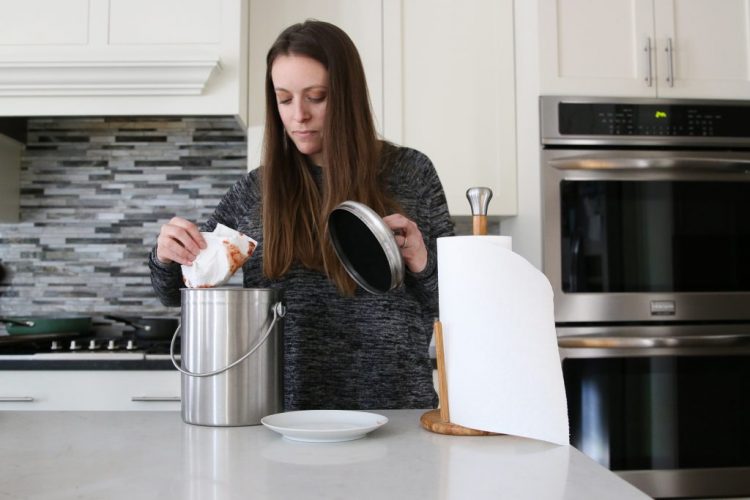
Bury or cover fresh scraps
To minimize odors and deter fruit flies, try burying fresh kitchen scraps in the existing compost or cover them with a layer of browns, such as sawdust or shredded paper. This helps create a barrier and reduces the exposure of fresh material to the air.
This principle works for an outdoor compost bin and also can help reduce issues in a countertop food scrap container. However, I would note that this solution is a temporary one and not a great long-term resolution.
Clean the container regularly
Give the compost container a thorough cleaning periodically to remove any lingering odors. Use a mild detergent or a vinegar-water solution to clean the container and the lid. Rinse it thoroughly before reusing it.
This step is most important if you choose not to use a compostable liner. For many years, I didn’t use liners, and I washed the countertop bin with soap and water after each time I emptied it. Now that I use a compostable liner in the bin, I rinse it after each use but only wash it with soap every third or fourth time I clean it. This seems to be sufficient for our kitchen situation.
Related Reading: 7 Simple Tips to Prevent Kitchen Compost Bins from Smelling
By following these tips, you can manage a countertop compost bin effectively, minimizing odors and preventing fruit flies from becoming a problem. In the end, there’s no magic wand to make composting an invisible process that just works. Once you get into a routine, it’s quite easy, but it does take some level of effort to clean up after ourselves in a responsible way. Oh, the fun of being an adult.
If you liked this post, you might also like:
6 Ways To Keep Your Curbside Composting Bucket Clean
15 Reasons To Compost (that have nothing to do with the planet)
Top 5 Easiest Ways To Compost At Home

Jen Panaro
Jen Panaro, founder and editor-in-chief of Honestly Modern, is a self-proclaimed composting nerd and advocate for sustainable living for modern families. To find her latest work, subscribe to her newsletter, Stepping Stones.
In her spare time, she’s a serial library book borrower, a messy gardener, and a mom of two boys who spends a lot of time in hockey rinks and on baseball fields.
You can find more of her work at Raising Global Kidizens, an online space to help parents and caregivers raise the next generation of responsible global citizens.

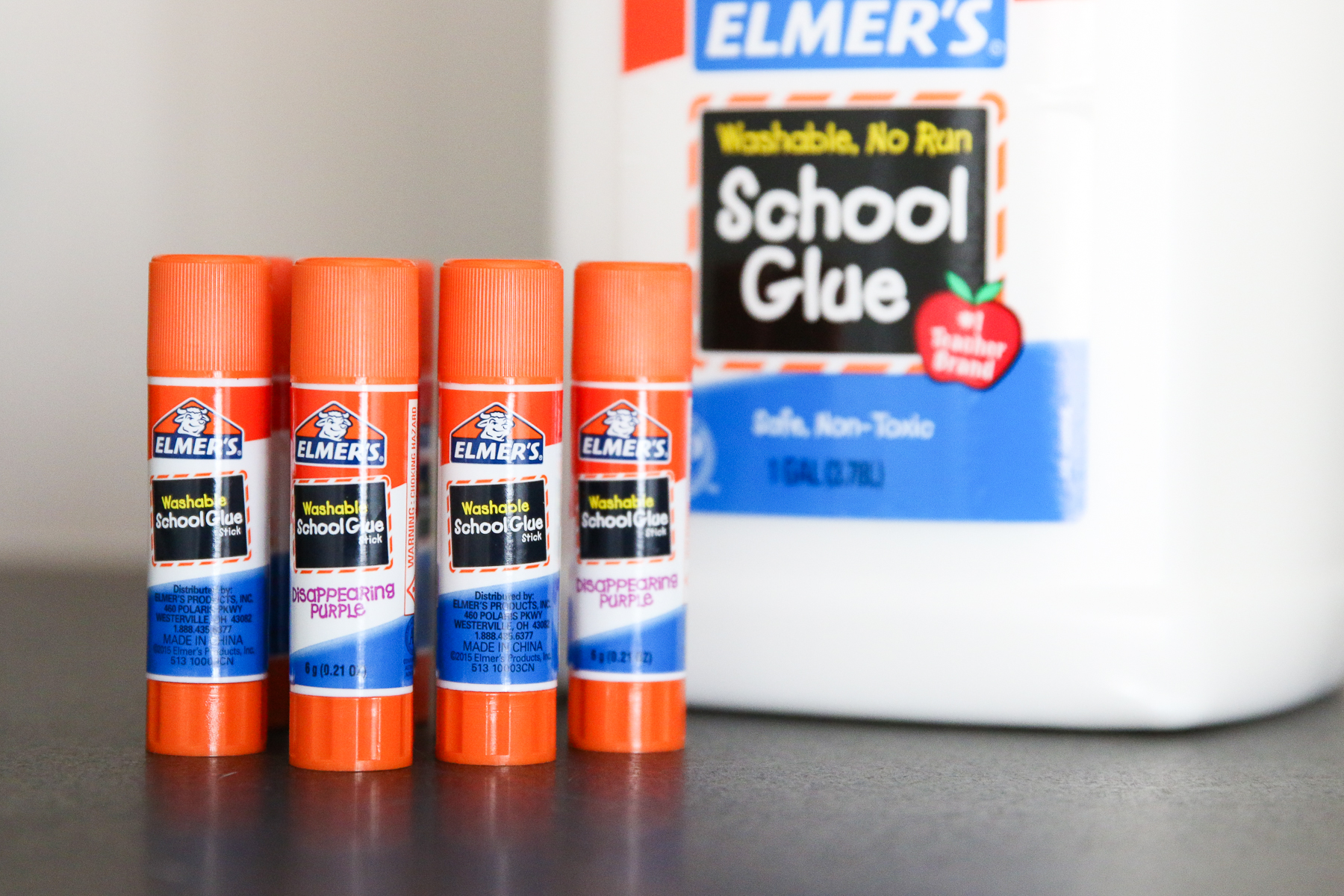


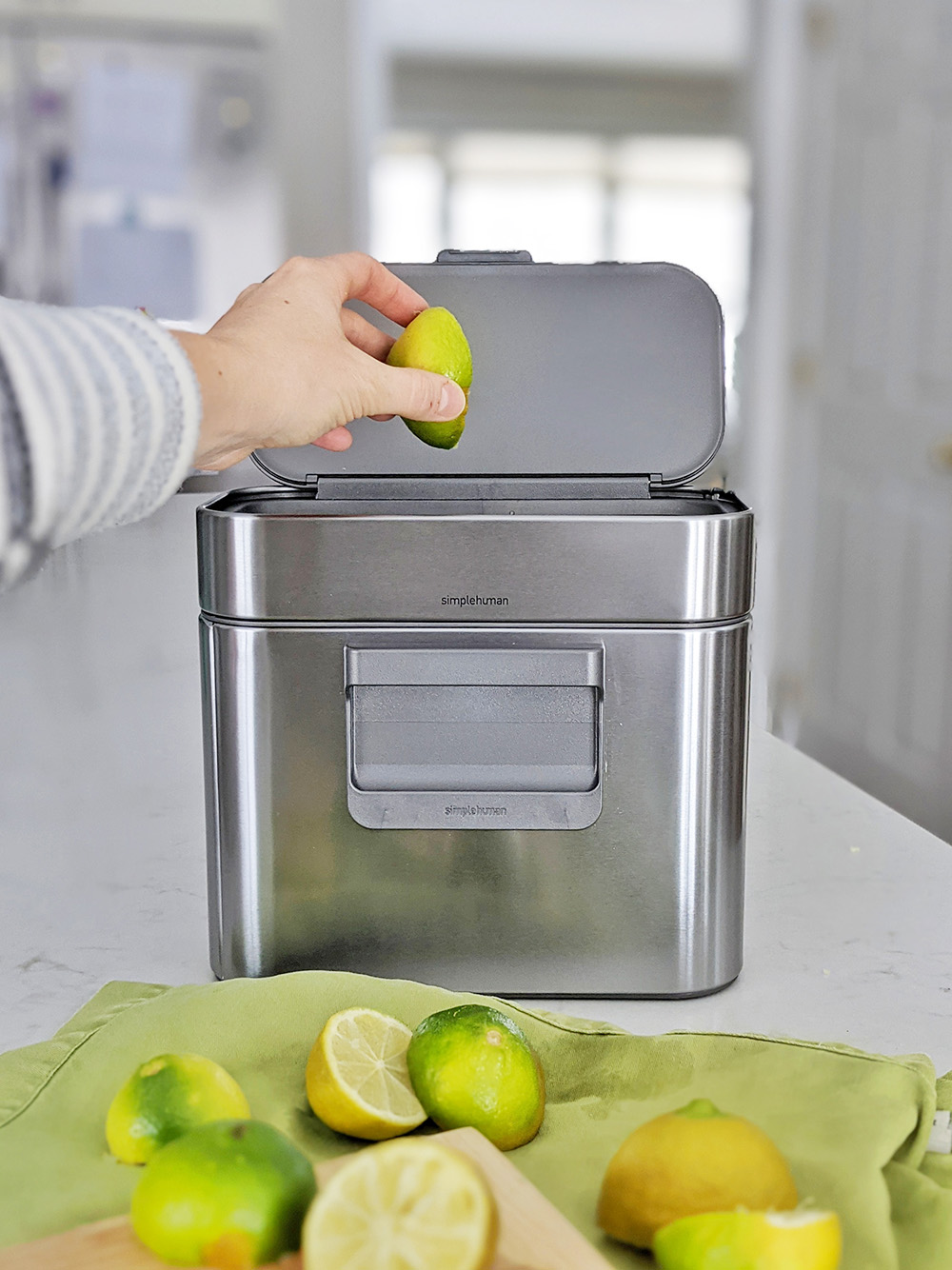



What is Japanese powder or material added to food wastes to not smell? I saw a bag in garden of landlored before 2021 but I forgot name & I have not used it. I suppose it is available in US or online.
I store food wastes in plastic containers or glass small bottles for seeds, garlic & onion peels if plastic bottles are not available. Then either freeze & refrigerate based on space available. One day before pickup by community greenhouse gardener I get them out of fridge to thaw then consolidate in bigger plastic container or bottles. I want to get compost mahines for kitchen countertop that decomposes food at the press of ON button. I did not see this in your email above. Cost may be more vs bin without electricity needed you suggest. Fast composts ready to add to pots with plants/herbs at home. No waiting time.
Do you have brands you have used or recommend based on experience personally or others?
Thanks much
[email protected]
Here is my favorite electric compost bin: https://www.honestlymodern.com/honest-reencle-prime-review/ — hope that helps.